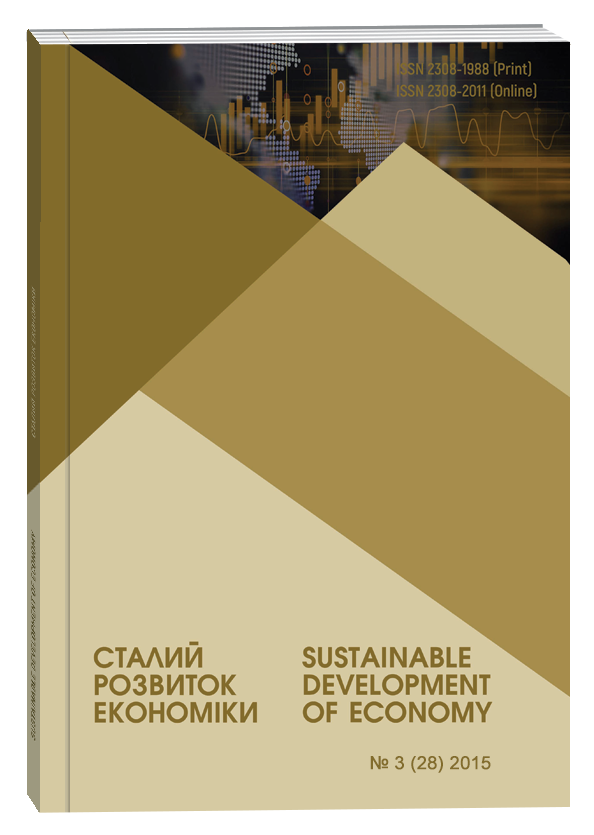SOCIAL PROGRAMS: CONCEPT AND STRUCTURE
Abstract
Purpose – theoretical justification of the essence and structure of social program aimed to increase its effectiveness. Methodology of research. Research methodology was based on generally accepted methods of scientific research: the monographic – for substantiation of theoretical positions of research subject; the theoretical generalization and morphological analysis – to improve the definition of "social program" and development the social programs structure; the tabular and graphical methods – to illustrate the research results; analysis, comparison, concretization and abstraction – to study features of analysis and estimation of social programs efficiency. Findings. As a result of analysis it was concluded that social program is a set of social measures aimed to solve particular social problem. Such program defines stages of the tasks realization, specific means and instruments for their implementation, leading to the determination of social outcomes. It was demonstrated that social programs are able to determine the optimal ratio of strategic and tactical tasks, and their movement as progressive. Originality. The definition of “social program” is improved. The social programs structure, which, unlike existing, is a set of types, directions, tools and management, which allow a more perfectly study the issue of an enterprise’s social initiatives, is got further development. Practical value. The results of definition research and enterprise’s social program structure generalization can be useful for enterprises when dealing with stakeholders, due to which the effective and comprehensive process of improving the performance of the enterprise in any industry will take place.
References
Ganescu M.C. Assessing Corporate Social Performance from a Contingency Theory Perspective /
M.C. Ganescu // Procedia Economics and Finance : International Conference Emerging Markets Queries in Finance and Business, Petru Maior University of Tîrgu Mures, (ROMANIA, October 24th – 27th, 2012). – 2012. – Volume 3. – рp. 999-1004.
Government as Partner. CSR Policy in Europe. – Gutersloh : Bertelsmann Stiftung, 2006. – p. 4.
Майстренко О.В. Аналіз оцінки ефективності корпоративної соціальної відповідальності / О.В. Майстренко // Сучасні проблеми управління підприємствами: теорія та практика : Матеріали міжнародної науково-практичної конференції, (м. Харків, 26-27 березня 2015 року). – Дніпропетровськ : Середняк Т.К., 2015. – С. 94-95.
Maistrenko O. Definition of corporate social responsibility / O. Maistrenko // Materials of All- Ukrainian scientific and practical conference of young scientists and students "Development of Ukraine by eyes of youth: social, economic and legal aspects" on April 18, 2013. – pр. 24-26.
Mazorenko O.V. Features of American and Japanese human resource management approaches / O.V. Mazorenko // Сучасні проблеми управління підприємствами: теорія та практика : Матеріали міжнародної науково-практичної конференції, (м. Харків, 26-27 березня 2015 року). – Дніпропетровськ : Середняк Т.К., 2015. – С. 39-41.
McGuire J.W. Business and Society / J.W. McGuire. – New York : McGraw-Hill, 1993. – 312 p.
Responding to the Leadership Challenge: Findings of a CEO Survey on Global Corporate Citizenship. – Geneva, 2003. – 32 p.
Sethi S.P. Dimensions of corporate social performance: An analytical framework / S.P. Sethi. – California : Management Review, 1975. – pр. 571-610.
Vasilik S. Relations with the personnel as priority sphere of social responsibility / S. Vasilik, O. Maistrenko // Modern problems of the economy development in the context of the world transformational changes : Monograph. – Opole : The Academy of Management and Administration in Opole, 2013. – pр. 49- 61.
Ganescu, M.C. (2012), “Assessing Corporate Social Performance from a Contingency Theory Perspective”, Procedia Economics and Finance : [International Conference Emerging Markets Queries in Finance and Business, Petru Maior University of Tîrgu-Mures], (ROMANIA, 24–27 October 2012), Vol. 3, pp. 999-1004.
Government as Partner. CSR Policy in Europe (2006), Bertelsmann Stiftung, Gutersloh, pp. 4.
Maistrenko, O.V. (2015), “Analysis of an assessment of social responsibility efficiency”, Suchasny problemy upravlinnia pidpryemstvamy: teoriia ta praktyka: [Modern problems of business management: theory and practice], Materialy mizhnarodnoi naukovo-praktychnoi konferentsii, [Proceedings of the International Scientific Conference], (Kharkiv, 26-27 March 2015), Seredniak T.K., Dnipropetrovsk, Ukraine, pp. 94-95.
Maistrenko, O. (2013), “Definition of corporate social responsibility”, Development of Ukraine by eyes of youth: social, economic and legal aspects : [Materials of All-Ukrainian scientific and practical conference of young scientists and students], (18 April 2013), рр. 24-26.
Mazorenko, O.V. (2015), “Features of American and Japanese human resource management
approaches”, Suchasni problemy upravlinnia pidpryiemstvamy: teoriia ta praktyka: [Modern problems of business management: theory and practice], Materialy mizhnarodnoi naukovo-praktychnoi konferentsii, [Proceedings of the International Scientific Conference], (Kharkiv, 26-27 March 2015), Seredniak T.K., Dnipropetrovsk, Ukraine, pp. 39-41.
McGuire, J.W. (1993) “Business and Society”, McGraw-Hill, New York, USA, 312 p.
Responding to the Leadership Challenge: Findings of a CEO Survey on Global Corporate Citizenship (2003), Geneva, 32 p.
Sethi, S.P. (1975), “Dimensions of corporate social performance: An analytical framework”, Management Review, California, USA, pp. 571-610.
Vasilik, S. and Maistrenko, O. (2013), “Relations with the personnel as priority sphere of social responsibility”, Modern problems of the economy development in the context of the world transformational changes, monograph, The Academy of Management and Administration in Opole, Opole, pp. 49-61.


